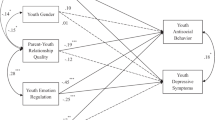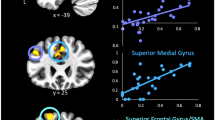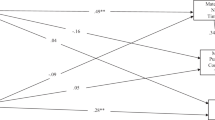Abstract
Adolescents’ responses to negative social experiences can be influenced by parenting behaviors. This includes how parents react to their child’s expression of emotions, an aspect of parenting referred to as emotion socialization. Emotion socialization may intersect with cultural values, particularly collectivism, a socially-relevant attitude that emphasizes the importance of interpersonal relationships. Examination of a neural measure called the feedback-related negativity (FRN), thought to reflect the degree to which feedback is experienced as aversive, could help elucidate neural contributions to and consequences of the role of collectivism in such family dynamics. Thus, this study examined whether adolescents’ endorsement of collectivism moderated the association of parents’ dismissive emotion socialization responses (called override responses) and FRN following peer rejection. A community sample of 83 Latinx (n = 32), Asian American (n = 20), and non-Latinx White (n = 31) adolescents ages 13–17 completed a computerized peer feedback task while continuous electroencephalogram was recorded. Their parents completed a battery of self-report questionnaires. Regression analyses demonstrated that adolescents’ endorsement of collectivism moderated the association of override responses and FRN following peer rejection, such that FRN was enhanced as override responses increased for adolescents endorsing low and moderate levels of collectivism. Results suggest that there is cultural variation in the association of the emotion socialization strategy of override and adolescents’ neural responses to socially-salient events. Findings have implications for parenting interventions designed to enhance adolescents’ emotion regulation abilities.


Similar content being viewed by others
References
Achenbach, T. M. (1991). Manual for the Youth Self-Report. Burlington, VT: Department of Psychiatry, University of Vermont.
Beilen, N. H., Green, L. M., & Thompson, R. J. (2018). Understanding emotion in adolescents: A review of emotional frequency, intensity, instability and clarity. Emotion Review, 11(1), 63–73.
Bennett, C., Melvin, G. A., Quek, J., Saeedi, N., Gordon, M. S., & Newman, L. K. (2019). Perceived invalidation in adolescent borderline personality disorder: An investigation of parallel reports of caregiver responses to negative emotions. Child Psychiatry & Human Development, 50, 209–221.
Bornstein, M. H., Putnick, D. L., Suwalsky, J. D., Venuti, P., de Falco, S., de Galperín, C., & Tichovolsky, M. (2012). Emotional relationships in mothers and infants: Culture-common and community-specific characteristics of dyads from rural and metropolitan settings in Argentina, Italy, and the United States. Journal of Cross-Cultural Psychology, 43(2), 171–197.
Bress, J. N., Foti, D., Kotov, R., Klein, D. N., & Hajcak, G. (2013). Blunted neural response to rewards prospectively predicts depression in adolescent girls. Psychophysiology, 50, 74–81.
Buckholdt, K. E., Parra, G. R., & Jobe-Shields, L. (2009). Emotion regulation as a mediator of the relation between emotion socialization and deliberate self-harm. American Journal of Orthopsychiatry, 79(4), 482–490.
Campos, J. J., Frankel, C. B., & Camras, L. (2004). On the nature of emotion regulation. Child Development, 75, 377–394.
Cao, J., Gu, R., Bi, X., Zhu, X., & Wu, H. (2015). Unexpected acceptance? Patients with Social Anxiety Disorder manifest their social expectancy in ERPs during social feedback processing. Frontiers in Psychology, 6(1745), 1–10.
Cole, P.M., & Tan, P. Z. (2016). Emotion socialization from a cultural perspective. In J. E. Grusec & P. D. Hastings (Eds.), Handbook of Socialization: Theory and Research (pp. 516–542). The Guilford Press.
Cracco, E., Goossens, L., & Braet, C. (2017). Emotion regulation across childhood and adolescence: Evidence for a maladaptive shift in adolescence. European Child & Adolescent Psychiatry, 26, 909–921.
DiBartolo, P. M., & Rendon, M. J. (2012). A critical examination of the construct of perfectionism and its relationship to mental health in Asian and African Americans using a cross-cultural framework. Clinical Psychology Review, 32, 139–152.
Eisenberg, N., Cumberland, A., & Spinrad, T. L. (1998). Parental socialization of emotion. Psychological Inquiry, 9, 241–273.
Eisenberg, N., Fabes, R. A., & Murphy, B. C. (1996). Parents’ reactions to children’s negative emotions: Relations to children’s social competence and comforting behavior. Child Development, 67(5), 2227–2247.
Fabes, R. A., Leonard, S. A., Kupanoff, K., & Martin, C. L. (2001). Parental coping with children’s negative emotions: Relations with children’s emotional and social responding. Child Development, 72, 907–920.
Foti, D., Weinberg, A., Dien, J., & Hajcak, G. (2011). Event-related potential activity in the basal ganglia differentiates rewards from nonrewards: Temporospatial principal components analysis and source localization of the feedback negativity. Human Brain Mapping, 32(12), 2207–2216.
Friedlmeier, W., Corapci, F., & Cole, P. M. (2011). Emotion socialization in cross-cultural perspective. Social and Personality Psychology Compass, 5(7), 410–427.
Garside, R. B. (2004). Parental socialization of discrete positive and negative emotions: Implications for emotional functioning. (Doctoral dissertation, The Catholic University of America). Dissertation Abstracts International, 65, 4828.
Garside, R. B., & Klimes-Dougan, B. (2002). Socialization of discrete negative emotions: Sex differences and links with psychological distress. Sex Roles, 47, 115–128.
Gehring, W. J., & Willoughby, A. R. (2002). The medial frontal cortex and the rapid processing of monetary gains and losses. Science, 295(5563), 2279–2282.
Gonzalez-Ramos, G., Zayas, L. H., & Cohen, E. V. (1998). Child-rearing values of low-income, urban Puerto Rican mothers of preschool children. Professional Psychology: Research and Practice, 29(4), 377–382.
Gottman, J. M., Katz, L. F., & Hooven, C. (1997). Meta-emotion: How Families Communicate Emotionally. Erlbaum.
Greenfield, P. M., Keller, H., Fuligni, A., & Maynard, A. (2003). Cultural pathways through universal development. Annual Review of Psychology, 54, 461–490.
Gu, R., Jiang, Y., Kiser, S., Black, C. L., Broster, L. S., Luo, Y., & Kelly, T. H. (2015). Impulsive personality dimensions are associated with altered behavioral performance and neural responses in the monetary incentive delay task. Neuropsychologia, 103, 59–68.
Harrewijn, A., van der Molen, M. J. W., van Vliet, I. M., Tissier, R. L. M., & Westenberg, P. M. (2018). Behavioral and EEG responses to social evaluation: A two-generation family study on social anxiety. NeuroImage: Clinical, 17, 549–562.
Hayes, A. F. (2017). Introduction to mediation, moderation, and conditional process analysis: Aregression based approach. Guilford Press.
Hazel, N. A., Oppenheimer, C. W., Technow, J. R., Young, J. F., & Hankin, B. L. (2014). Parent relationship quality buffers against the effect of peer stressors on depressive symptoms from middle childhood to adolescence. Developmental Psychology, 50, 2115–2123.
Heinrichs, N., Rapee, R. M., Alden, L. A., Bögels, S., Hofmann, S. G., Ja, Oh., & K., & Sakano, Y. (2006). Cultural differences in perceived social norms and social anxiety. Behaviour Research and Therapy, 44, 1187–1197.
Hewig, J., Kretschmer, N., Trippe, R. H., Hecht, H., Coles, M. G. H., Holroyd, C. B., & Miltner, W. H. R. (2011). Why humans deviate from rational choice. Psychophysiology, 48, 507–514.
Hitokoto, H., Glazer, J., & Kitayama, S. (2016). Cultural shaping of neural responses: Feedback-related potentials vary with self-construal and face priming. Psychophysiology, 53, 52–63.
Holroyd, C. B., & Coles, M. G. H. (2002). The neural basis of human error processing: Reinforcement learning, dopamine, and the error-related negativity. Psychological Review, 109(4), 679–709.
Holroyd, C. B., & Krigolson, O. E. (2007). Reward prediction error signals associated with a modified time estimation task. Psychophysiology, 44, 913–917.
Ispa, J. M., Fine, M. A., Halgunseth, L. C., Harper, S., Robinson, J., Boyce, L., & Brady-Smith, C. (2004). Maternal intrusiveness, maternal warmth, and mother-toddler relationship outcomes: Variations across low-income ethnic and acculturation groups. Child Development, 75, 1613–1631.
Kehoe, C. E., Havinghurst, S. S., & Harley, A. E. (2020). Tuning in to Teens: Investigating moderators of program effects and mechanisms of change of an emotion focused group parenting program. Developmental Psychology, 56(3), 623–637.
Keller, H., Lamm, B., Abels, M., Yovsi, R., Borke, J., Jensen, H., Papaligoura, Z., Holub, C., Lo, W., Tomiyama, A. J., Su, Y. (2006). Cultural models, socialization goals, and parenting ethnotheories: A multi-cultural analysis. Journal of Cross-Cultural Psychology, 37, 155–172.
Kessel, E. M., Kujawa, A., Proudfit, G. H., & Klein, D. N. (2015). Neural reactivity to monetary rewards and losses differentiates social from generalized anxiety in children. The Journal of Child Psychology and Psychiatry, 56(7), 792–800.
Klimes-Dougan, B., Brand, A., & Garside, R. B. (2001). Factor structure, reliability, and validity of an emotion socialization scale. In C. O’Neal (Chair), Multiple approaches to emotion socialization: Methodology and emotional development. Symposium conducted at the annual meeting of the American Psychological Association, San Francisco, CA.
Klimes-Dougan, B., Brand, A. E., Zahn-Waxler, C., Usher, B. A., Hastings, P. D., Kendziora, K. T., & Garside, R. B. (2007). Parental emotion socialization in adolescence: Differences in sex, age and problem status. Social Development, 16, 326–342.
Kujawa, A., Arfer, K. B., Klein, D. N., & Proudfit, G. H. (2014). Electrocortical reactivity to social feedback in youth: A pilot study of the Island Getaway Task. Developmental Cognitive Neuroscience, 10, 140–147.
Levinson, A. R., Speed, B. C., Nelson, B., Bress, J. N., & Hajcak, G. (2017). Authoritarian parenting predicts reduced electrocortical response to observed adolescent offspring rewards. Social Cognitive and Affective Neuroscience, 363–371.
Liu, F. F., & Goto, S. G. (2007). Self-construal, mental distress, and family relations: A mediated moderation analysis with Asian American adolescents. Cultural Diversity and Ethnic Minority Psychology, 13(2), 134–142.
Luck, S. J., & Gaspelin, N. (2017). How to get statistically significant effects in any ERP experiment (and why you shouldn’t). Psychophysiology, 54, 146–157.
Lugo-Candelas, C. I., Harvey, E., & Breux, R. P. (2015). Emotion socialization practices in Latina and European American mothers of preschoolers with behavior problems. Journal of Family Studies, 21(2), 144–162.
Magai, C. M. (1996). Emotions as a child self-rating scale. Long Island University: Unpublished.
Makeig, S., Bell, A. J., Jung, T. P., & Sejnowski, T. J. (1996). Independent component analysis of electroencephalographic data. Advances in Neural Information Processing Systems, 8, 145–151.
McCord, B. L., & Raval, V. V. (2016). Asian Indian immigrant and White American maternal emotion socialization and child socio-emotional functioning. Journal of Child and Family Studies, 25, 464–474.
McDermott, J. M., Pears, K. C., Bruce, J., Kim, H. K., Roos, L., Yoerger, K. L., & Fisher, P. A. (2018). Improving kindergarten readiness in children with developmental disabilities: Changes in neural correlates of response monitoring. Applied Neuropsychology: Child, 7(3), 187–199.
Mezulis, A. H., Hyde, J. S., & Abramson, L. Y. (2006). The developmental origins of cognitive vulnerability to depression: temperament, parenting, and negative life events in childhood as contributors to negative cognitive style. Developmental Psychology, 42, 1012–1025.
Miller, G. A., & Yee, C. M. (2015). Moving psychopathology forward. Psychological Inquiry, 26(3), 263–267.
Morris, A. S., Criss, M. M., Silk, J. S., & Houltberg, B. J. (2017). The impact of parenting on emotion regulation during childhood and adolescence. Child Development Perspectives, 11, 233–238.
Mothes, H., Enge, S., & Strobel, A. (2016). The interplay between feedback-related negativity and individual differences in altruistic punishment: An EEG study. Cognitive, Affective, and Behavioral Neuroscience, 16, 276–288.
O’Neal, C. R., & Magai, C. (2005). Do parents respond in different ways when children feel different emotions? The emotional context of parenting. Development and Psychopathology, 17(2), 467–487.
Oppenheimer, C. W., Ladouceur, C. D., Waller, J. M., Ryan, N. D., Allen, K. B., Sheeber, L., Forbes, E. E., Dahl, R. E., & Silk, J. S. (2016). Emotion socialization in anxious youth: Parenting buffers emotional reactivity to peer negative events. Journal of Abnormal Child Psychology, 44, 1267–1278.
Oyserman, D. (1993). The lens of personhood: Viewing the self, others, and conflict in a multicultural society. Journal of Personality and Social Psychology, 65, 993–1009.
Oyserman, D., Coon, H. M., & Kemmelmeier, M. (2002). Rethinking individualism and collectivism: Evaluation of theoretical assumptions and meta-analysis. Psychological Bulletin, 128(1), 3–72.
Park, H., Coello, J. A., & Lau, A. S. (2014). Child socialization goals in East Asian versus Western nations from 1989 to 2010: Evidence for social change in parenting. Parenting: Science and Practice, 14(2), 69–91.
Perry, N. B., Dollar, J. M., Calkins, S. D., Keane, S. P., & Shanahan, L. (2020). Maternal socialization of child emotion and adolescent adjustment: Indirect effects through emotion regulation. Developmental Psychology, 56(3), 541–552.
Pintar Breen, A. I., Tamis-LeMonda, C. S., & Kahana-Kalman, R. (2017). Latina mothers’ emotion socialization and their children’s emotion knowledge. Infant and Child Development, 27, 1–14.
Pluess, M. (2015). Individual differences in environmental sensitivity. Child Development Perspectives, 9(3), 138–143.
Polezzi, D., Daum, I., Rubaltelli, E., Lotto, L., Civai, C., Sartori, G., & Rumiati, R. (2008). Mentalizing in economic decision-making. Behavioural Brain Research, 90, 218–223.
Rodas, N. V., Chavira, D. A., & Baker, B. L. (2017). Emotion socialization and internalizing behavior problems in diverse youth: A bidirectional relationship across childhood. Research in Developmental Disabilities, 62, 15–25.
Santesso, D. L., Dzyundzyak, A., & Segalowitz, S. J. (2011). Age, sex, and individual differences in punshment sensitivity: Factors influencing the feedback-related negativity. Psychophysiology, 48, 1481–1488.
Schneiders, J., Nicolson, N. A., Berkhof, J., Feron, F. J., DeVries, M. W., & van Os, J. (2007). Mood in daily contexts: Relationship with risk in early adolescence. Journal of Research on Adolescence, 17(4), 697–722.
Severo, M. C., Walentowska, W., Moors, A., & Pourtois, G. (2017). Goal impact influences the evaluative component of performance monitoring: Evidence from ERPs. Biological Psychology, 129, 90–102.
Shorey, H. S., Cowan, G., & Sullivan, M. P. (2002). Predicting perceptions of discrimination among Hispanics and Anglos. Hispanic Journal of Behavioral Sciences, 24(1), 3–22.
Silk, J. S. (2019). Context and dynamics: The new frontier for developmental research on emotion regulation. Developmental Psychology, 55(9), 2009–2014.
Singelis, T. M. (1994). The measurement of independent and interdependent self-construals. Personality and Social Psychology Bulletin, 20(5), 580–591.
Soder, H. E., Suchting, R., & Potts, G. F. (2020). Electrophysiological responses to appetitive and aversive outcomes: A comparison of college drinkers and non-drinkers. Neuroscience Letters, 714, 134549.
Soto, J. E., Lee, E. A., & Roberts, N. A. (2016). Convergence in feeling, divergence in physiology: How culture influences the consequences of disgust suppression and amplification among European Americans and Asian Americans. Psychophysiology, 53, 41–51.
Soto, J. A., Perez, C. R., Kim, Y.-H., Lee, E. A., & Minnick, M. R. (2011). Is expressive suppression always associated with poorer psychological functioning? A cross-cultural comparison between European Americans and Hong Kong Chinese. Emotion, 11(6), 1450–1455.
Steinberg, L., & Morris, A. S. (2001). Adolescent development. Annual Review of Psychology, 52, 83–110.
Tan, P. Z., Lee, K. H., Dahl, R. E., Nelson, E. E., Stroud, L. J., Siegle, G. J., & Silk, J. S. (2014). Associations between maternal negative affect and adolescents’ neural response to peer evaluation. Developmental Cognitive Neuroscience, 8, 28–39.
Tan, P. Z., Oppenheimer, C. W., Ladouceur, C. D., Butterfield, R. D., & Silk, J. S. (2020). A review of associations between parental emotion socialization behaviors and the neural substrates of emotional reactivity and regulation in youth. Developmental Psychology, 56(3), 516–527.
Taylor, Z. E., Eisenberg, N., Spinrad, T. L., Eggum, N. D., & Sulik, M. J. (2013). The relations of ego-resiliency and emotion socialization to the development of empathy and prosocial behavior across early childhood. Emotion, 13(5), 822–831.
Vargas, J. H., & Kemmelmeier, M. (2013). Ethnicity and contemporary American culture: A meta-analytic investigation of horizontal-vertical individualism-collectivism. Journal of Cross-Cultural Psychology, 44(2), 195–222.
Voegler, R., Peterburs, J., Bellebaum, C., & Straube, T. (2019). Modulation of feedback processing by social context in social anxiety disorder (SAD)- an event-related potentials (ERPs) study. Nature Scientific Reports, 9(4795), 1–14.
Wang, Q. (2001). Culture effects on adults’ earliest childhood recollection and self-description: Implications for the relation between memory and the self. Journal of Personality and Social Psychology, 81, 220–233.
Waters, S. F., Karnilowicz, H. R., West, T. V., & Mendes, W. B. (2020). Keep it to yourself? Parent emotion suppression influences physiological linkage and interaction behavior. Journal of Family Psychology, Advance online publication.
Wechsler, D. S. (1999). Wechsler Abbreviated Scale of Intelligence. The Psychological Corporation.
Wu Shortt, J., Fainsilber Katz, L., Allen, N. B., Leve, C., Davis, B., & Sheeber, L. B. (2016). Emotion socialization in the context of risk and psychopathology: Mother and father socialization of anger and sadness in adolescents with depressive disorder. Social Development, 25(1), 27–46.
Yoon, J., & Lau, A. S. (2008). Maladaptive perfectionism and depressive symptoms among Asian American college students: Contributions of interdependence and parental relations. Cultural Diversity and Ethnic Minority Psychology, 14, 92–101.
Zhu, X., Wang, L., Yang, S., Gu, R., Wu, H., & Luo, Y. (2016). The motivational hierarchy between the personal self and close others in the Chinese brain: An ERP study. Frontiers in Psychology, 7(1467), 1–7.
Zhu, X., Wu, H., Yang, S., & Gu, R. (2016). Motivational hierarchy in the Chinese Brain: Primacy of the individual self, relational self, or collective self? Frontiers in Psychology, 7(877), 1–7.
Funding
This study was supported by a National Institute of Mental Health (NIMH) Ruth L. Kirschstein National Research Service Award Individual Predoctoral Fellowship (F31MH111187; PI: Amy M. Rapp, Ph.D.). Dr. Rapp was supported by a NIMH Institutional Training Grant (T32MH15144; PI: Steven Roose, M.D.) during preparation of the manuscript.
Author information
Authors and Affiliations
Corresponding author
Ethics declarations
Conflict of Interest
The authors have no conflicts of interest to declare.
Ethical Approval
The study was approved by the Institutional Review Board at the University of California, Los Angeles.
Informed Consent Statement
Written informed consent was obtained from participants' legal guardian, and written assent was obtained from participants.
Additional information
Publisher’s Note
Springer Nature remains neutral with regard to jurisdictional claims in published maps and institutional affiliations.
Rights and permissions
About this article
Cite this article
Rapp, A.M., Tan, P.Z., Grammer, J.K. et al. Cultural Values Influence Relations Between Parent Emotion Socialization and Adolescents’ Neural Responses to Peer Rejection. Res Child Adolesc Psychopathol 50, 255–267 (2022). https://doi.org/10.1007/s10802-020-00764-y
Accepted:
Published:
Issue Date:
DOI: https://doi.org/10.1007/s10802-020-00764-y




